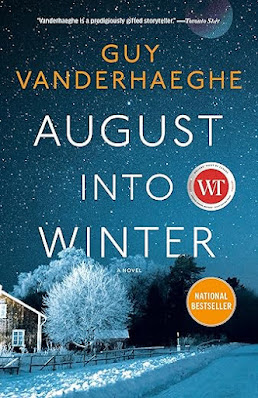I continue a personal tradition of posting Bill’s Best of Fiction on December 31. I like to make it a genuine assessment of my reading for the full calendar year. My next post will have Bill’s Best of 2024 Non-Fiction and a personal category of Bill’s Most Interesting of 2024. The lists do include books published earlier than 2024.
For the first time my favourite works of fiction were all written by Canadian authors.
For the best of 2024 fiction:
1.) August Into Winter by Guy Vanderhaeghe - The author has justly gained fame for being one of Saskatchewan’s best writers for almost two generations.
His novel set late in the Depression superbly captures the difficulties of that era in rural Saskatchewan.
His characters, small and large, are vividly drawn.
He explores deeply the psyches of his characters. In particular, he delved into the mind of the killer, I said in one of my posts on the book.
I appreciated, you cannot say liked, his portrayal of the twisted killer, Ernie Sickert. Guy’s descriptions of the distorted reality and rationalizations of Ernie were chilling.
I later said:
None of the main characters are enjoying life at Connaught. Despair is a constant refrain. I found myself wishing there was more light to go with the dark.
I found fascinating how Vanderhaeghe took the story of a real life murder in his hometown of Esterhazy and turned it into a master work of crime fiction.
2.) From Sweetgrass Bridge by Anthony Bidulka - Anthony returns to Bill’s Best list with the second book of his Merry Bell series.
I was drawn to the book for a pair of reasons.
First, Anthony set me thinking about the minds and motivations of his characters, especially his sleuthing team of the transgender Merry and the cross-dressing Roger Brown. I wrote:
The resolution stretched my credibility but the complexity of relationships explored was breathtaking. Identities past and present, festering resentments, faces and bodies unrecognized after profound change, hurts given and received, confessions, regrets, the chance for new friendships and hope moved me. All of us are fragile in our own ways. I consider From Sweetgrass Bridge Anthony’s best examination of human vulnerability.
Second, I was a character in the book in my real life pasttime of being a sports reporter. I acknowledge my bias. I do not often read of bloggers recognizing a personal bias. I believe the joy I took in being a character was secondary. It was Anthony’s skill that put the book on this list.
3.) The Long-Shot Trial by William Deverell - Deverell has been recounting trials from the life of Arthur Beauchamp for decades. In The Long-Shot Trial he tells the story of Arthur’s first major murder trial which took place in far northern B.C. rather than Vancouver.
What I enjoyed most in the book were two women.
Arthur’s client, Angelina Santos, is a pregnant 20 year old Filipina immigrant.
He finds her a challenge:
Arthur is dismayed by his client’s honesty:
But I would find it awkward relating to a client who, apparently, was incapable of telling lies. Most of my defendants hadn’t suffered that handicap.
She is a Catholic woman of great faith. She refers to her unborn child as a “beautiful miracle”.
Unlike most works of legal fiction opposing legal counsel are not vilified, especially the young Crown Prosecutor, Clara Moncrief, assisting the lead Crown, Ed Santorini. Arthur admires more than her legal skills:
He is beguiled by the comely Miss Moncrief. Will he venture into a relationship with a Crown?
There are some twists I sensed but did not discern the actual surprises.
I look forward to every Deverell book. The Long-Shot Trial is one of his best:
The trial is riveting. The stretching of trial propieties was present but not over done. Deverell is a master craftsman of legal mysteries. Arthur Beauchamp is a barrister nonpariel.
Best wishes in your reading for 2025.









